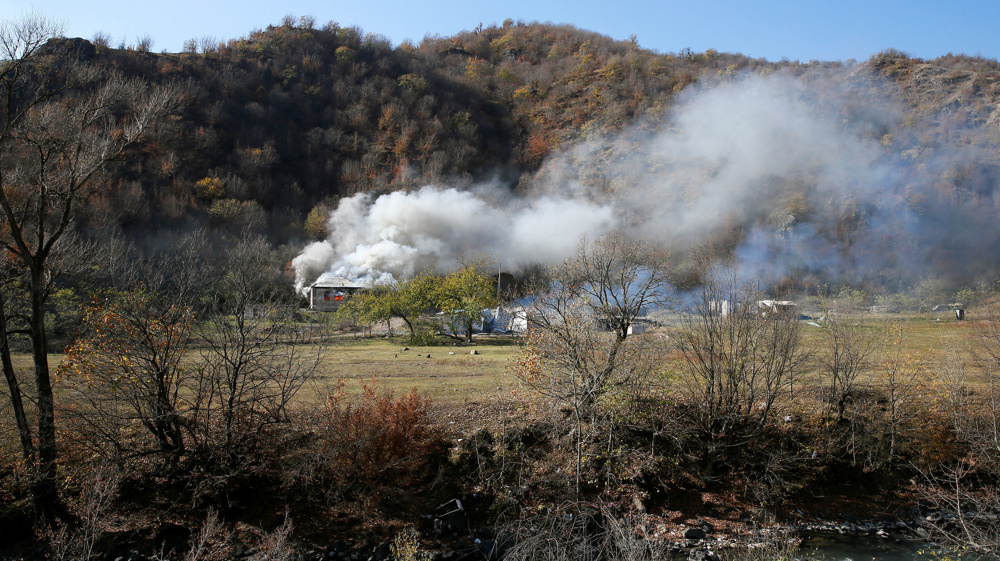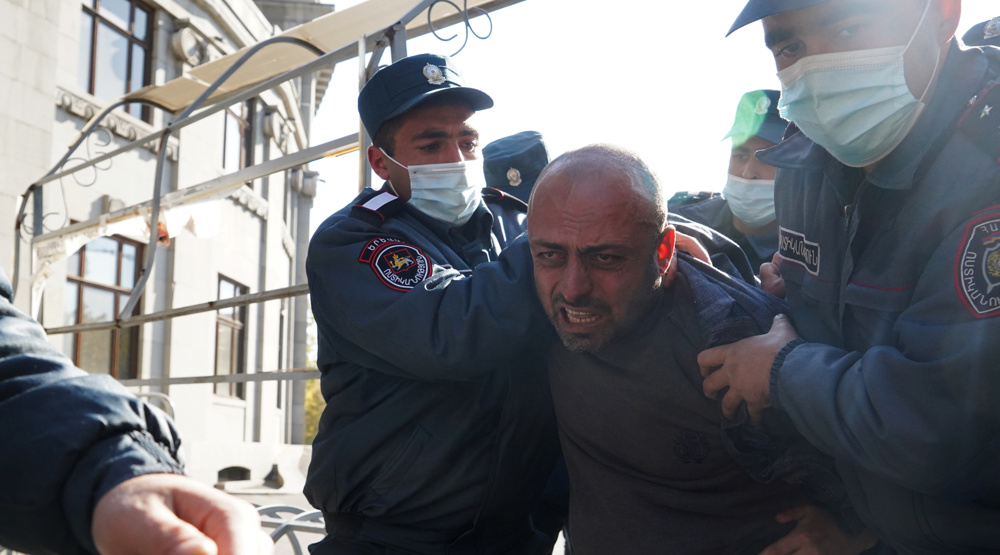Azerbaijan extends deadline for Armenian pullout from Kalbajar
Azerbaijan has agreed on the extension of a deadline by which Armenians must pull out of the Kalbajar district as part of a Russian-brokered ceasefire that puts an end to six weeks of fierce fighting.
“Azerbaijan agreed to prolong the deadline for the withdrawal from Kalbajar of Armenian armed forces and of illegal Armenian settlers until November 25,” said Hikmet Hajiyev, the foreign policy advisor to Azerbaijani President Ilham Aliyev, on Sunday.
Under the deal, Armenians had to return the district by November 15.
Hajiyev said the deadline for the return of two other districts, namely Aghdam and Lachin, remained unchanged and they should be handed over by November 20 and December 1, respectively.
Azerbaijani forces have already retaken Fuzuli, Jabrayil, Zangilan, Qubadli, and Shusha as well as villages that add up to 300 settlements in total, according to Baku.
Hajiyev stressed that Baku had agreed to extend the deadline on humanitarian grounds to grant an Armenian request for the delay following mediation by Russian President Vladimir Putin.
“Kalbajar’s settlement by Armenians was illegal. The people who were resettled there have no property rights,” he added at a press conference.
Karabakh is internationally recognized as part of Azerbaijan, but it has been held by ethnic Armenian separatists backed by Armenia since 1992 when they broke from Azerbaijan in a war that killed some 30,000 people.
The conflict re-erupted in late September, becoming the worst fighting in the region in decades.
After weeks of fighting in and around Karabakh, the separatist junta government of the region finally acknowledged last week that it had lost control of the mountain enclave’s second-largest city of Shusha and that Azerbaijani forces were closing in on the main city of Khankendi, which Armenians call Stepanakert after a Bolshevik militant in the late 19th century.
Yerevan and Baku eventually agreed to end hostilities on Tuesday, under the Moscow-brokered deal that secured territorial advances for Azerbaijan in Karabakh and seven surrounding districts.
The truce, which was warmly welcomed as a victory in Azerbaijan, has prompted anger in Armenia. Protesters on Friday demanded the resignation of Prime Minister Nikol Pashinyan.
Armenian politician busted over alleged Pashinyan assassination
On Sunday, lawyers of Artur Vanetsyan, head of the center-right Homeland party, said that their client had been arrested a day earlier by Armenian security forces over the accusation of preparing to seize power after the assassination of Pashinyan.
They described the detention as “persecution” and denied the allegations against Vanetsyan.
Late on Saturday, Armenian security services announced the arrest of another unnamed man “with anti-government views” who was purportedly found in possession of a “large number of weapons.”
They said the suspect was preparing “an assassination attempt against a public figure and the seizure of power” in step with "politicians with anti-government views and their supporters.”
Pashinyan has come under pressure in recent days, with thousands of demonstrators protesting since Tuesday and demanding he step down over the ceasefire deal with Azerbaijan.
The Armenian prime minister, who is blamed by anti-government protesters for being a “traitor”, said earlier this week he had no choice but to sign the agreement to prevent further territorial losses, calling the situation a “catastrophe.”
He stressed that he was taking personal responsibility for the setbacks, but rejected calls for his resignation.
Under the agreement, 2,000 Russian peacekeeping troops are being deployed to the region.
Activists announce 'Freedom and Sumud Flotilla' to challenge Gaza blockade
VIDEO | Rome residents demand end to ties with Israeli firms
VIDEO | Pakistan Senate condemns ‘hexagon of alliances’ as Indian PM visits Israel
VIDEO | Founder of French pro-Palestine NGO appears before court
VIDEO | Modi’s Israel visit sparks opposition, domestic backlash
VIDEO | Continuous war on media in occupied West Bank
Kabul rocked by explosions as Pakistan launches airstrikes
Iran Armed Forces warn US of severe consequences for any aggression















 This makes it easy to access the Press TV website
This makes it easy to access the Press TV website